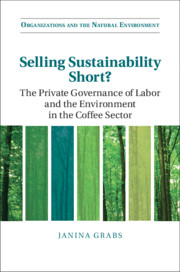 Selling Sustainability Short?
Selling Sustainability Short? Published online by Cambridge University Press: 28 April 2020
Chapter 5 draws on the survey data to show how private standards are implemented in the field. It introduces three avenues through which standards may address different definitions of sustainability: to drive sustainable intensification, to shift time horizons backward, or to act as payments for social and ecosystem services. It then evaluates standards’ success by evaluating a range of production practices in each category. It shows that particularly industry-friendly standards encourage farmers to intensify their production, with moderate success, but that simultaneous decreases in input use are rarer. Improvements in practices that encourage farmers to make short-term investments for longer-term gains in terms of health or farm resilience can be observed, but often depend on outside financial support. Finally, the chapter finds very few improvements in practices that constitute long-term opportunity costs, for two reasons: one, over time many standards have lowered the stringency of their requirements for high-opportunity-cost practices such as the maintenance of permanent shade cover. Two, even when rules are binding (e.g., minimum wage laws), they are not always followed.
To save this book to your Kindle, first ensure [email protected] is added to your Approved Personal Document E-mail List under your Personal Document Settings on the Manage Your Content and Devices page of your Amazon account. Then enter the ‘name’ part of your Kindle email address below. Find out more about saving to your Kindle.
Note you can select to save to either the @free.kindle.com or @kindle.com variations. ‘@free.kindle.com’ emails are free but can only be saved to your device when it is connected to wi-fi. ‘@kindle.com’ emails can be delivered even when you are not connected to wi-fi, but note that service fees apply.
Find out more about the Kindle Personal Document Service.
To save content items to your account, please confirm that you agree to abide by our usage policies. If this is the first time you use this feature, you will be asked to authorise Cambridge Core to connect with your account. Find out more about saving content to Dropbox.
To save content items to your account, please confirm that you agree to abide by our usage policies. If this is the first time you use this feature, you will be asked to authorise Cambridge Core to connect with your account. Find out more about saving content to Google Drive.